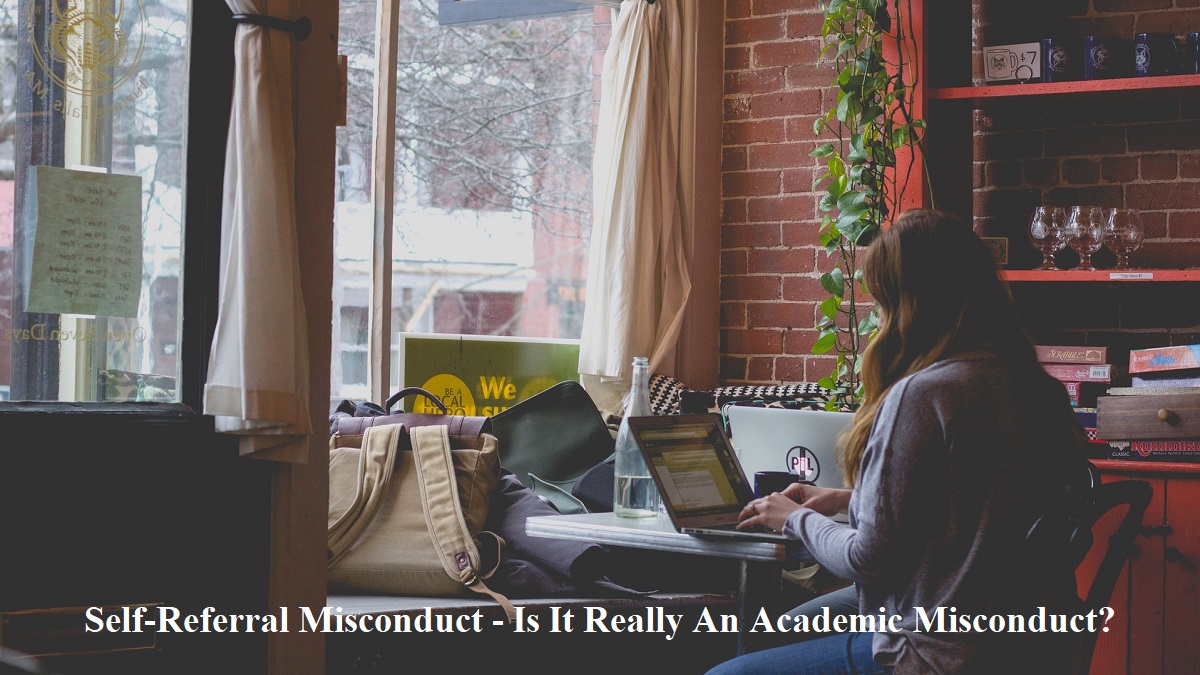Academic life is full of different challenges to get high achievements. Some etiquettes and rules are necessary to follow for students. If somebody does not follow these regulations, it affects academic performance. Academic regulation is a vital factor that is important to follow and remain optimistic, creative and responsible. Without considering rules, it leads to academic misconduct, which is an offence in the academic aspects. Thus, it is unethical to get benefits from illegal activities for high grades and performance. Helping others to get academic benefits or self-advantages and both are part of academic misconduct. Students must observe these points in academic life to reduce issues.
What is Self-Referral Misconduct?
Self-referral misconduct is a way to accept the offence and unethical activity. It provides a chance for students before the final decision to admit offence. Moreover, it helps to get flexibility or forgiveness from teachers and committees. It is the act to admit that a student has attained educational benefits in an unethical way. After that, he realises the mistake, and now he wants to apologise and is ready to bear the consequences. This thing is self-referral misconduct in academic activities. Due to informing the academic misconduct committee before the decision, showing responsibility and feeling shame, this act saves the student from a brutal punishment. This article by top academic experts provides the importance of self-referral misconduct, its types and evaluation. It also focuses on if self-referral misconduct is academic misconduct or not.
Logic and Arguments on Self-Referral Misconduct
There are different logics and arguments on the nature of self-referral misconduct. Academic institutes and committees on academic misconduct have different points of view. Some universities from UK and Australia have a zero-tolerance policy on these acts. Although many of them have encouraged self-referral misconduct in academic activities. In this way, accepting the mistake and presenting self for the consequences is proof of responsibility and regret, which should be considered for forgiveness.
In this way, the mistake of the student should not be considered as academic misconduct and must give a chance to him for improvement. This thing will encourage him for positivity, and he will never repeat the academic misconduct. When the committee does not consider his self-referral misconduct and punish him, it leads to more negativity. Thus, there is a need to forgive and move forward for positivity and improvement. Based on this conclusion, self-referral is not academic misconduct and must appreciate students’ goodness and academic performance.
Types of Self-Referral Misconduct
Academic misconducts are different in types and actions, but essential to develop and apply a formal and legal framework. All actions and unethical benefits have different types of punishment. Self-referral misconduct in these actions is vital to admit mistakes and bear results. Thus, students are at first not involved in these kinds of activities. Secondly, if they have made the wrong action, then they must admit it and bear consequences. Following are types of academic self-referral misconduct that students make in their academic life:
Plagiarism
It is the first thing students use in academic writing to get high grades. Students’ abstract ideas and information from other people work and claim their findings. It is not a good thing and is against academic and research ethics. It considers plagiarism because the original source is not cited. Any information and idea from other research work without providing credit is plagiarism. Besides, academic misconduct is a serious crime, and there is a zero-tolerance policy. If students have copied the data from any other source, they must accept it before the final result. Also, submission and copying from old work is a type of plagiarism. In all these cases, self-referral misconduct is a single thing that can provide leverage.
Submitting Same Paper for Different Courses
When the student has no idea what they should do in assignments and deadlines, this situation forces them to get benefits in an unethical way. In this way, the use of the same paper in different courses is a vital activity. It is against morality and results in the course failure. It is the responsibility of a student to complete work on time and meet instructions. Further, it is advised to not submit the same paper in different courses because it affects all subjects. It is also suggested to get some time from teachers through a formal request and ensure submission. In case of submission for a different course with the same paper, students must accept the mistake and use self-referral misconduct before teachers regarding their tests and marks.
Taking Exams with Other People
It is an issue that students sometimes make without considering the future results. The use of other people in exams to get high grades is a significant offence that academics in general do not tolerate. The committee of academic misconduct of any university has the authority to take serious action on this offence. The appearance of another person in virtual or physical exams is unethical. It affects the results and positions of eligible students. If any student has done this wrong act, he must apologise and admit the mistake. This attitude of self-referral misconduct is the only way to save the student from suspension or any other outcome.
Cheating
Cheating is another unethical way to use helping material in both academic writing and exams to get high marks and affect other rights. The use of other students’ papers in their assignments and written material in the exams are the best examples of cheating in academic activities. It is a negative activity to get benefits from unethical acts. Students should not use these kinds of actions in academic writing. In case if it occurs, the student must apologise to the teacher and committee. May use of self-referral misconduct helps to get less punishment.
Collaboration of Students Without Permission
It is usual to get help from fellows to complete the assignments. It is against morals and harms the skills of creativity. How will he resolve issues when he does not apply his ideas in developing something? It is a significant issue that students should resolve. Some tasks make students enable to develop a skill of problem-solving skills and resolve issues. Thus, collaboration is considered as an unethical act of students.
Buying of Papers and Assignments
Buying paper from any resource and getting paid assignments are vital issues in academic life. Students take this opportunity to relax and pass the course with little effort. It is against academic conduct and rules, which leads to brutal punishment. In case of buying paper and assignments, students must accept the mistake. Severe consequences are there for those who are using this way to influence the students. In this way, only self-referral misconduct will help in resolving issues.
Conclusion
Self-referral misconduct is only a way to deal with the issues of academic issues. Without this, it leads to severe punishment in return for academic misconduct. It provides a sense of regret and responsibility.






